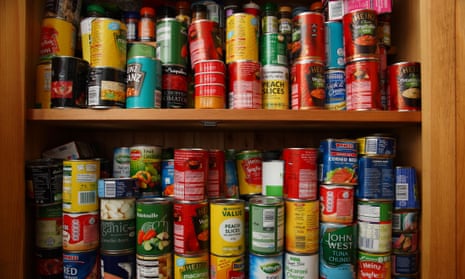The story broke on Tuesday that the government, in anticipation of a no-deal Brexit, has been drawing up plans to stockpile processed foods, in the event that, by 29 March next year, they have still not worked out a way to maintain the free flow of goods – which includes food and medical supplies – between EU producers and UK consumers. Because the UK, as has been repeatedly pointed out since the 2016 referendum, produces only half of what it eats. And, when it comes to fruit and vegetables, 40% of fresh produce comes from the EU.
A free flow of goods means minimal delays in transit, which is crucial for anything fresh. As the head of the British Retail Consortium warned Theresa May and Michel Barnier last week, a no-deal Brexit could mean “food rotting at ports”.
Of course, if the flipside of a no-deal Brexit is a UK-US trade deal like Nafta, things aren’t looking any cheerier. As Julian Baggini highlighted in June, an influx of cheaper, ultra-processed, high-sugar American foods will no doubt come with higher obesity rates. So, stockpiling – despite its slightly hysterical, end-of-the-world connotations – might be a sensible thing to do. It’s also what every reasonable What to Eat As a Student guide always starts with.
While you can, for example, source British-produced flour, oats, sugar (from beets), salt (by Maldon, for example), vinegar (apple cider, say, as opposed to balsamic), mustard (although the Colman’s factory in Norwich is closing next year), Marmite (the Burton upon Trent factory isn’t going anywhere but, frankly, who can risk a run on their supplies?), lentils and more, you’ll want a stash of your high-quality EU goods, too. Start with olive oil, pepper, pasta and rice. For flavour, you’ll want spices, chilli and herbs, anchovies and tomato (paste, tinned and passata).
Then you need bulk and protein: canned and dried pulses (kidney beans, butter beans, black beans, chickpeas) and tinned fish (sardines and tuna). Add to that tinned olives, pickled capers and jarred peppers, and you’ve basically got a cheat’s Ottolenghi.
The good news is that, while Britain doesn’t produce enough of the fresh produce it needs, it certainly can. As farmers Jane Scotter and Guy Watson pointed out the last time there was a scare, this country grows wonderful stuff – and you don’t need a field to start. So, while you’re stockpiling canned goods, buy a stash of seed packets, too.

Comments (…)
Sign in or create your Guardian account to join the discussion